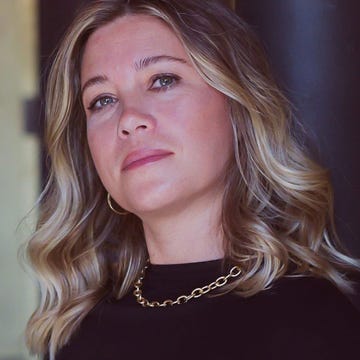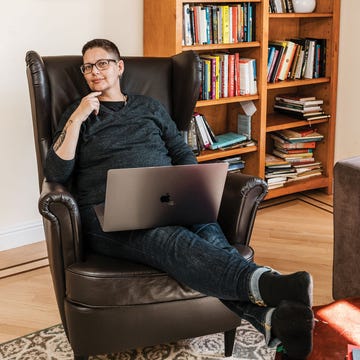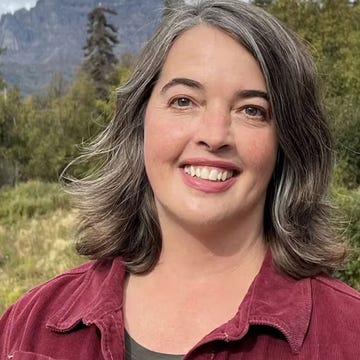Several injuries were sustained in the making of the Werner Herzog film Fitzcarraldo, about a man determined to transport a steamship over the Andes Mountains to secure access to unclaimed rubber territory with an eye toward funding the building of an opera house in the Amazon. Some of those injuries are detailed in Les Blank’s documentary Burden of Dreams; as the director of Fitzcarraldo, Herzog is determined to have the shots exactly as he wants them, forgoing special effects, whatever the cost. At one point, the script calls for the ship to go through dangerous rapids, a sequence that results in injuries to the real-life film crew.
“There’s no doubt that Fitzcarraldo was on my mind when I first started that sequence with the boat,” Joanna Howard tells me over Zoom from her living room, referring to her enigmatic, witty, and richly allusive novel Porthole. She notes that she was interested in those tyrannical, “sort of on the edge of insane, mostly white male European directors” like Herzog, though she hastens to add that he’s “on the softer side of things.” She was also thinking about Alfred Hitchcock, who trapped Tippi Hedren in a room with live starved crows and other birds (having told her they would be mechanical) to get a better performance, and Jean-Pierre Melville, whose demands and exactitude took a grave toll on his actors.
The main character and narrator of Porthole is a director, Helena Désir, who grew up on a houseboat outside Sausalito with her uncle and whose tyrannical outlook on filmmaking has led to an accident on the water involving her lover, the leading man in her latest film. As the novel begins, Helena is arriving at Jaquith House, a luxurious asylum that runs on the principle that every person you encounter will have a therapeutic purpose, where she will stay to recover from psychic exhaustion, under the supervision of Dr. Duvaux. We start to learn her story through what she tells him and other quirky characters staying at the asylum, including a sound artist and a pair of Finnish massage therapists.
Work on the novel began with the idea of a boat accident on set. The first scene that Howard wrote about 15 years ago was one in which Helena is on a boat that has become unmoored and she’s recognizing she might be the only one left on it as the craft tosses around in the river. When Howard wrote the scene, she didn’t know what gender the narrator was going to be, though she did think the narrator would be a person working on a film in some capacity and that the film would be based on a long short story she’d written that featured a prison-escape sequence.
While working on the book, Howard wondered whether Herzog’s or Hitchcock’s or Melville’s controlling behavior could exist in a female director and what that would look like if it did. The female filmmaker who wound up being most important to creating Helena, Howard says, was Agnès Varda, because she’d begun her career as a photographer. Howard, who read many director biographies while writing the book, notes that lots of female directors from the ’50s and ’60s began as “amazing technicians.” Auteur theory demands that to be an auteur, the director must be skillful in technical aspects of filmmaking, like cinematography.
Initially, Howard found it difficult to write into the mindset of a tyrannical woman. Howard explains that in life, she’s a people pleaser who can be anxious around direct conflict, so Helena’s mind felt far afield. “However, what I do associate with her is a desire to micro-control environments. When I began writing her, I tried to initially lean into some of the things that I could identify with, and then I got a sense of what she needed, which was really a kind of authority and a kind of power that just wasn’t in early drafts,” Howard says. The book took years to write, and Howard believes it took so long because of the difficulties with getting into Helena’s mind when “she just seemed kind of like a mannequin.”
Jaquith House was inspired by the film Now, Voyager, starring Bette Davis and featuring a Dr. Jaquith, an eccentric psychiatrist who analyzes Davis’s character, who is having a nervous breakdown. The structure of Now, Voyager, in which Davis’s character tells her story to Dr. Jaquith, also informs the structure of Porthole. Davis is mousy and beleaguered, with a tyrannical and controlling mother, and Helena sees herself as the latter type. Dr. Duvaux questions that self-perception, saying, “I am trying to decide if you are quite the tyrant you imagine yourself to be. At the heart of tyranny is fear.”
Howard grew up in a rural community, in a family that was “very obsessed with watching stuff.” Her mother was a film buff and was over age 40 when she had her. As a World War II baby growing up in a tiny town in Oklahoma, Howard’s mother went to the movie theater to get news and would stay to watch movies. She saw Howard as her “little moviegoing companion” (Howard’s father was “more of a TV guy,” something Howard writes about in her memoir, Rerun Era). There was the sense, too, that Howard’s mom saw Hollywood as a place of left or liberal visions and loved moviegoing because she was a rare liberal in her community.
The movies Howard viewed with her mother were far beyond the ones usually seen by children. When she was six, she watched Taxi Driver, and as a child, she also saw Midnight Cowboy, which was initially X-rated. Howard’s mother may have thought she was giving Howard an education in adulthood, but, Howard says, it fostered in Howard the sense that “if there was anything that I wanted to get from the world that I wasn’t getting in another way, that the movie, that some movie, would have it right. Like, if I wanted to learn about history, or I wanted to experience romance, or I wanted to see people with backgrounds that were, like, my whatever, I would go and I would find it in a movie.” Indeed, connection arising out of screen-based storytelling appears as a recurring theme across Howard’s body of work. In addition to Rerun Era, one of her books is about Hitchcock’s Foreign Correspondent.
Howard herself considered going into filmmaking. However, she went to state school on scholarship, and filmmaking classes were very expensive. She was an art history student in a program that involved not only history but also studio art. “At least in my generation, arts really were not accessible to everyone, just because materials were so expensive,” she says. She was an avid reader as much as she was a viewer; when she first got access to a word processor at age 13, she wrote a fantasy novel. In junior high, she’d write choose-your-own-adventure romances for her friends that featured whatever celebrities they were obsessed with and slip the stories into their lockers, thereby developing a “robust friend group.” In contrast to filmmaking or art, Howard says, “I found creative writing as a place which involved no costs whatsoever.”
Although Howard conducted a good deal of research for the book, verisimilitude wasn’t the goal. The reality of the fictional world within Porthole feels unstable and dreamlike. As Helena tells Dr. Duvaux, “No one in my industry is sure of anything. Filmmaking is a nest of insecurity and paranoia.” Jaquith House itself was intended to feel like a series of interlocking sets. Howard found it difficult to shut the book down because of the opportunity it gave her to build an enchanting “series of spaces” that she wanted to stay in. “I like architectural spaces that work like dream spaces, because you kind of float through these spaces without questioning why they’re changing around you in a dream,” she says. “The person is cognizant and [thus] able to be like, Wait a second. How did I end up in a railcar inside a house?”•
Anita Felicelli is Alta Journal ’s books editor and the author of How We Know Our Time Travelers, Chimerica, and Love Songs for a Lost Continent.













